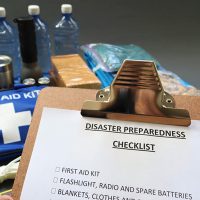Floodwater Safety Tips For Homeowners

During Florida’s hurricane season, homeowners face potential risks from any number of dangers. Hurricanes pose obvious threats due to extreme high winds and flying debris. Some of the most significant damage, however, can come in the form of flooding and flood-related damage.
If you, your family, or other loved ones in Florida live in or near an area affected by a hurricane, it is critical to watch for signs of flooding and know what to do when floodwaters arrive.
How is flooding caused by a hurricane? Hurricanes bring high winds, heavy rain, and storm surges that cause tides to rise and push large amounts of water onto shore – and into residential and commercial zones. Another complicating factor with hurricanes is that the severe wind gusts and powerful waves can erode barriers meant to keep water out of living areas. This creates problems during the storm and in future weather events if these barriers are not restored.
Even areas not directly near the coastline can be hit by hurricane-related flooding. When a hurricane’s torrential downpours arrive too fast for the soil to absorb the water or for storm drains to handle runoff, flash flooding can occur.
Flooding can cause serious economic damage, with FEMA estimating that every inch of floodwater causes $25,000 worth in damage to a property.
What to Do In the Event of Flooding in a Florida Hurricane
Flooding can lead to financial hardship and complicated insurance claims. At the same time, hurricane-related flooding can put people’s safety and lives at risk. Those in affected areas must know how to take proper precautions and act when flooding does arrive.
Some important safety tips for floods during a hurricane include:
- Check your neighborhood’s flood zone in advance of a storm to see how vulnerable your area is to flooding;
- Check for gas leaks and stay away from electrical lines;
- Make sure your vehicle has gas (and an extra canister of gas available if possible);
- Stock your home with non-perishable foods. If using canned food, make sure you have a hand-held can opener that is non-electrical;
- Keep flashlights and extra batteries available;
- Make sure you have safety plans in place for your pets if you have any. It is easy for dogs, cats, and other pets to get lost during a storm;
- Make sure you have safety plans in place for children, and they know what to do when a storm arrives;
- Floodwater can carry tremendous amounts of harmful waste, bacteria, and other harmful substances. Make sure to avoid direct contact whenever possible, and disinfect any items that have been submerged in floodwater;
- Avoid long exposure to floodwater and wear waterproof boots and other gear if possible;
- Always avoid driving into any flooded streets; you don’t know how deep the water can be and whether it can damage your car or take it under. As a rule of thumb, if you can’t see the pavement, do not drive into a watery surface.
After a hurricane or any type of storm-related flood, it can be difficult to pull things back together and get back to normal. Adding to the struggle can be disputes with your home insurer over what should be covered and paid for under your policy. If you run into any issues getting paid what you deserve after a hurricane-related flood, the hurricane insurance attorneys at Bundza & Rodriguez are here to help.
Contact Us Today
The Daytona, Florida property damage insurance attorneys at Bundza & Rodriguez, P.A., know the games insurers can play when it comes to sorting out damage and payouts after a hurricane. If you have insurance coverage that covers flooding, we can help make sure your claim gets covered in the amount you are entitled to. If you have any questions, call our Daytona law offices today at 386-252-5170, or schedule a consultation with our Daytona Beach property damage attorneys online.
Source:
agents.floodsmart.gov/hurricane-season-in-your-community
